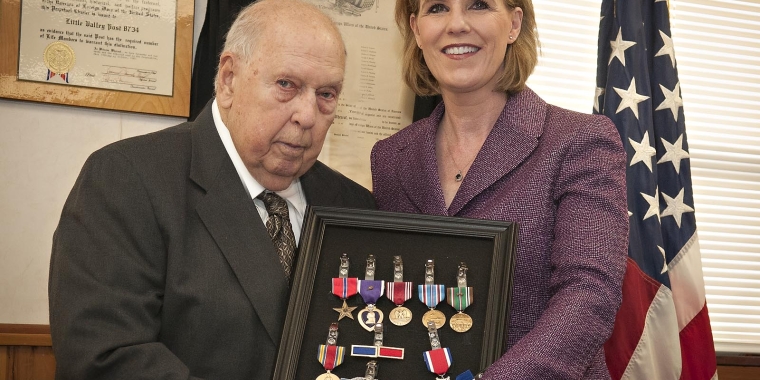
Cattaraugus County Veteran Franklin R. West Honored in Medal Ceremony
Catharine Young
January 4, 2014
-
ISSUE:
- Veterans

For Release: Immediate, January 4, 2014
U.S. Army Sgt. Franklin R. West Receives Awards for Military Service During World War II
LITTLE VALLEY - In recognition of his outstanding record of military service, U.S. Army veteran Franklin R. West has finally received the military decorations he deserves.
During a ceremony at the Little Valley VFW Post today, Senator Catharine Young (R,C,I - Olean) presented Sergeant West with the military medals he earned while serving overseas during World War II. After being contacted by the West family, Senator Young worked to ensure that Sergeant West’s honorable service was duly recognized and he received the long overdue awards his service merits.
“The incredible story of Sergeant Franklin West’s service is an inspiration, and I am honored to be able to take part in recognizing him today. For his willingness to put himself on the line for us in World War II and bear the wounds of battle for our sake, he deserves our utmost respect and thanks. May the prestigious awards he receives today serve as a constant reminder for us of the price of freedom and those who have bravely defended it,” said Senator Young.
Born in Napoli, New York, on January 6, 1925, U.S. Army Sgt. Franklin R. West’s military service began when he was drafted into the U.S. Army on June 15, 1943. Sergeant West would serve for the next two years, five months, and seven days, with 11 months and 10 days of that time spent overseas in World War II’s European Theater, either in combat or convalescing in hospital from battlefield injuries.
As a rifleman, Sergeant West arrived in Europe on September 1, 1944, and was assigned to the 112th Infantry Regiment of the 28th Infantry Division, or the “Keystone Division,” which would go on to become one of the most decorated infantry divisions in the U.S. Army.
Under the command of Major General Norman “Dutch” Cota, the 28th fought for the liberation of Paris and, with Sergeant West, then pushed forward into Germany, attacking German forces in the Hürtgen Forest in a battle that would become the longest battle on German ground during the war and the longest single battle the U.S. Army has ever fought. From September 19 to December 16, 1944, over approximately 50 square miles east of the Belgian-German border, American and German divisions engaged in fierce fighting.
In a dense labyrinth of well camouflaged pillboxes with interlocking fields of fire, thick belts of barbed wire, and dense minefields set up by the Germans, the U.S. Army sustained heavy casualties, with at least 33,000 killed or wounded.
During the battle, the 28th Infantry Division was assigned the task of capturing the Town of Schmidt and intercepting a major German supply route. In the first phase, on November 1, 1944, Sergeant West’s 112th Infantry Regiment took responsibility for the main effort - capturing the Village of Vossenack before crossing the Kall River gorge and capturing Schmidt. This required moving through more than three miles of extremely difficult wooded terrain, barbed wire, and mine fields.
In the battle, Sergeant West sustained multiple gunshot wounds and mortar injuries. He was shot twice in the head, once in the chest, and took shrapnel in the leg and foot. Recounting the experience, Sergeant West recalled how a nurse at the hospital asked him if he had sustained either a bullet wound or a shrapnel wound. He recalled responding that “it went through there so darn fast I couldn’t tell her.”
The U.S. Army Office of History has given a detailed account of the battle and Sergeant West’s participation in it. The account notes that after a barrage of enemy machine gun fire that decimated advancing troops, American 2nd Lt. John B. Wine (Sergeant West’s Platoon Leader) crawled to within twenty-five yards of the German position and knocked out at least one machine gun with a hand grenade. At the lieutenant’s signal, two squads of troops then assaulted the position and overcame the remaining German gunners before moving onward to the Village of Vossenack.
Sixty years later, now retired Army Col. John B. Wine recalled in an interview that while charging into enemy fire, a bullet struck his rifle, knocking it out of his hands. He turned and saw Private West on the ground, trying to wrap a bandage around his head wound. Amid the barrage of heavy mortar and automatic weapons fire, Lieutenant Wine helped wrap the bandage around his head. He then took West’s rifle and ammunition and proceeded with the attack.
Lieutenant Wine and Sergeant West would not see each other again for 66 years. After being contacted by a dentist researching the survivors of the platoon, Sergeant West was given Lieutenant Wine’s telephone number. In May 2010, now-retired Col. Wine received a tongue-in-cheek message from Sergeant West: “I want my rifle back.”
The colonel knew it was Sergeant West and the two brothers in arms have remained in contact ever since.
Despite his chances of survival after the Battle of the Hürtgen Forest being doubtful, not only did Sergeant West recover, but he returned to combat in what would become known as the Battle of the Bulge.
“I guess I was going to come back to the states, but then when the Battle of the Bulge came, anybody that could walk they grabbed and sent back to the front,” Sergeant West recalled of the lack of fresh reinforcements.
At the Battle of the Bulge, Sergeant West and Allied forces successfully beat back a German counter-offensive in the Ardennes region that Germany launched immediately after the Battle of the Hürtgen Forest.
After the Battle of the Bulge, Sergeant West and the U.S. Army continued its push eastward into Germany, where he would be wounded again.
“I was riding in a truck when a German threw a shell in. There just wasn’t room for it,” said Sergeant West.
Sergeant West recovered again and after the German surrender in May 1945, rather than remaining with occupying forces in Germany, Sergeant West boarded a troop ship back to the United States on July 27, 1945, where he began preparing to join the fight against Japan in the Pacific.
As the war with Japan also came to a close, Sergeant West was later honorably discharged from the Army on December 5, 1945.
After completing his years of honorable service defending our country, Sergeant West returned to Western New York where he married Joyce Nobles in 1949. Together they raised their three sons: Ronald, Randall, and Charles.
In 1954, Sergeant West would begin working at Signore Tool & Die Co. in Ellicottville as a die maker, where he remained for approximately the next 30 years.
After Joyce passed away in 1982, Sergeant West remarried Marcia Evans in 1991, with whom he also has five stepchildren: Sandra, William, Jennie, Russell, and Robert.
In honor of his heroic service, Senator Young presented to Sergeant West the U.S. Army’s Bronze Star Medal, the Purple Heart with Bronze Oak Leaf Cluster, the Good Conduct Medal, the American Campaign Medal, the European-African-Middle Eastern Campaign Medal with Two Bronze Service Stars, the World War II Victory Medal, the Presidential Unit Citation, the Meritorious Unit Commendation, the Combat Infantryman Badge, and the Honorable Service Lapel Button.
In addition, from the New York State Division of Military and Naval Affairs, he received the New York State Conspicuous Service Cross and Conspicuous Service Star.
“I always thought that I didn't get those medals. We as a unit got those medals. I always felt that way,” said Sergeant West on the honors bestowed upon him today.
“Sergeant West’s wartime service and the character he has shown in never seeking any glory or praise on his own behalf reminds us what the sacrifice of our veterans is all about and what he and others have done for us. We can all admire and aspire to emulate Sergeant West, who has our sincerest gratitude and appreciation,” said Senator Young.
###
Share this Article or Press Release
Newsroom
Go to NewsroomRevitalization Funding Coming For the City of Salamanca
January 26, 2017
State Funding Will Continue Revitalizatoin Efforts in Downtown Olean
January 26, 2017